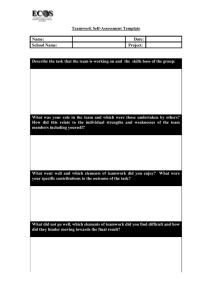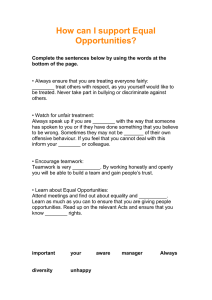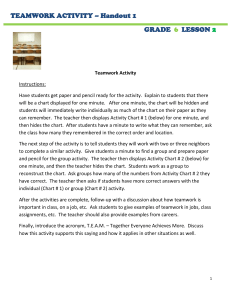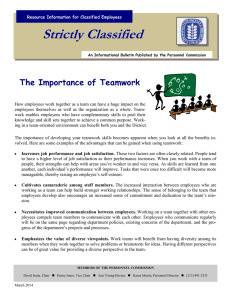1) How much teamwork/group work did you do in this... None (0) ... Teamwork Self-Assessment
advertisement
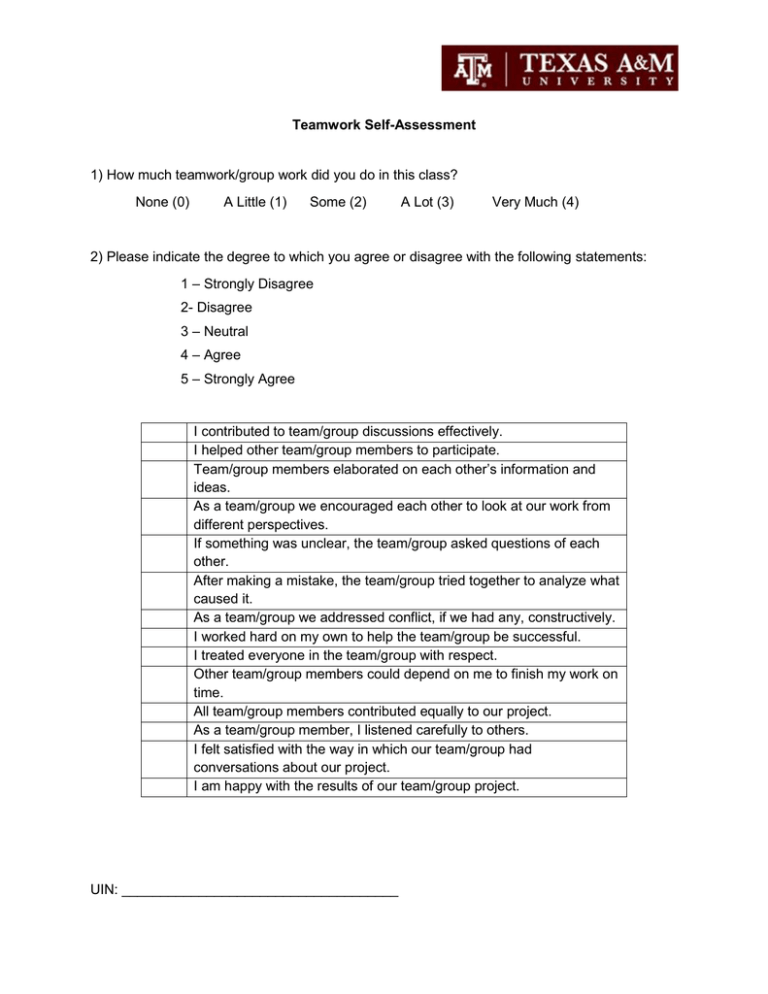
Teamwork Self-Assessment 1) How much teamwork/group work did you do in this class? None (0) A Little (1) Some (2) A Lot (3) Very Much (4) 2) Please indicate the degree to which you agree or disagree with the following statements: 1 – Strongly Disagree 2- Disagree 3 – Neutral 4 – Agree 5 – Strongly Agree I contributed to team/group discussions effectively. I helped other team/group members to participate. Team/group members elaborated on each other’s information and ideas. As a team/group we encouraged each other to look at our work from different perspectives. If something was unclear, the team/group asked questions of each other. After making a mistake, the team/group tried together to analyze what caused it. As a team/group we addressed conflict, if we had any, constructively. I worked hard on my own to help the team/group be successful. I treated everyone in the team/group with respect. Other team/group members could depend on me to finish my work on time. All team/group members contributed equally to our project. As a team/group member, I listened carefully to others. I felt satisfied with the way in which our team/group had conversations about our project. I am happy with the results of our team/group project. UIN: ____________________________________ Communication Courses in the American History category focus on the consideration of past events and ideas relative to the United States, and involve the interaction among individuals, communities, states, the nation, and the world. Core Objectives Critical Thinking Skills: To include creative thinking, innovation, inquiry, and analysis, evaluation and synthesis of information Communication Skills: To include effective development, interpretation and expression of ideas through written, oral and visual communication Teamwork: To include the ability to consider different points of view and to work effectively with others to support a shared purpose or goal Personal Responsibility: To include the ability to connect choices, actions and consequences to ethical decision-making Definition: Teamwork is behaviors under the control of individual team members (effort they put into team tasks, their manner of interacting with others on the team, and the quantity and quality of contributions they make to team discussions.) Framing language: Students participate on many different teams, in many different settings, over a variety of time periods. For example, a student may work on separate teams to complete a lab assignment, give an oral presentation, complete a community service project, or participate in a semester long group project. Thus, the work that students produce that could be used to demonstrate a student’s teamwork skills could include a range of artifacts. Additionally, following/recording a group’s processes over time in order to assess the quality of the teamwork can be time prohibitive. Therefore, this rubric is a self-assessment designed to measure the quality of a process, rather than the quality of an end product. This rubric is also designed to assess the teamwork of an individual student, not the team as a whole. This rubric is adapted from the Association of American Colleges and Universities Teamwork Value Rubric, Briggs, R. O., Reinig, B. A., & de Vreede, G.J. (2006). Meeting satisfaction for technology-supported groups: An empirical validation of a goal-attainment model. Small Group Research, 37,585-611, and Savelsbergh, C.M.J.H., van der Heijden, B.I.J.M., & Poell, R. F. (2009). The development and empirical validation of a multidimensional measurement instrument for team learning behaviors. Small Group Research, 40, 578-607.
